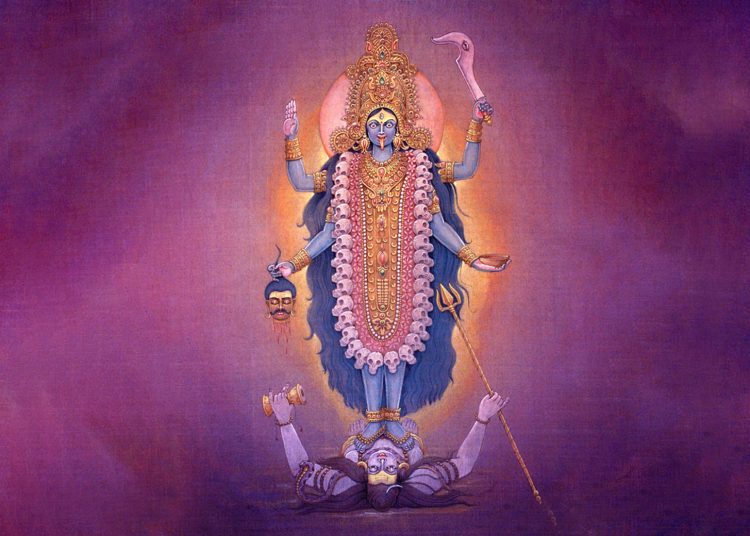Kali is considered the ‘forceful’ form of the Goddess Durga. Other Goddesses who are less ‘forceful’ form, such as Parvati, Sita and Sati, are also said to emanate Kali, or even become her, to defeat enemies. These enemies are sometimes only susceptible to female assault, making the intervention of the male consort impossible.
There are different stories about her origins:
-
Mundaka Upanishad
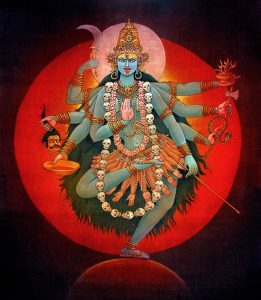
Verse 1.2.4
gives the earliest textual reference of the name where she is listed as one of the seven tongues of Agni. This could be the basis of the origin of the Sapta Matrika cult.
kālī karālī ca manojavā ca sulohitā yā ca sudhūmravarṇā |
sphuliṅginī viśvarucī ca devī lelāyamānā iti sapta jihvāḥ || 4 ||
Kali, karali, also manojava, sulothia, sudhumravarna, sphulingini, and visvaruchi are the seven moving tongues of fire.
Rudra Samhita 2.53 – When Nandi informed Shiva about Sati’s death, he became very furious. He angrily pulled out a locks of hair and dashed it against the mountain, which got divided into two parts. From one part manifested the valiant Veerbharda and from the other part Mahakali. Veerbhardra marched with a h
uge army which included the mighty Shivaganas like Dakini, Bhairav and Kapalish etc. Goddess Kali to joined him with her army which consisted of all her nine incarnations like Katyayani etc. As the army marched on numerous auspicious signs were visible.
Uma Samhita 5.16 – Bhagawati manifested herself in the form of Kali from the mouth and eyes of lord Vishnu at the time Madhu and Kaitabh are born from Vishnu’s ear-wax and attack Brahma.
2. Kali in Shiva Mahapuraan
Rudra Samhita 2.53 – When Nandi informed Shiva about Sati’s death, he became very furious. He angrily pulled out a locks of hair and dashed it against the mountain, which got divided into two parts. From one part manifested the valiant Veerbharda and from the other part Mahakali. Veerbhardra marched with a huge army which included the mighty Shivaganas like Dakini, Bhairav and Kapalish etc. Goddess Kali to joined him with her army which consisted of all her nine incarnations like Katyayani etc. As the army marched on numerous auspicious signs were visible.
Uma Samhita 5.16 – Bhagawati manifested herself in the form of Kali from the mouth and eyes of lord Vishnu at the time Madhu and Kaitabh are born from Vishnu’s ear-wax and attack Brahma.
-
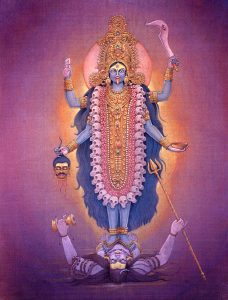
Kali – The fierce form of the primordial feminine Origin of Kali in Matsya Puran
On one particular occasion, Shiva addressed Parvati as Kali. Parvati thought that Shiva was referring to her dark complexion. She did not realize that Shiva was merely trying to tease her a bit. Greatly incensed at the imagined slight, Parvarti decided that she would meditate so that she might become fair. Brahma granted her the boon that she would become fair. Since the word ‘gouri’ means fair, Parvati was thereafter known as Gouri. A goddess named Koushiki emerged out of Parvati’s cells, thus named because the word kosha means cell. The darkness of Parvti’s complexion entered Koushiki’s body. Brahma requested the goddess Koushiki to go and live in the Vindhya mountains. She is therefore also known as Vindhyavasini.
-
Origin of Kali in Linga Puraan
Chapter 1.106 – The story mentions the appearance of Kali to kill demon Daruk who could only be killed by a woman, and Parvati was asked by the gods to deal with the troublesome demon. She responded by jumping down Shiva’s throat. By combining with the poison still held in Shiva’s th
roat, Parvati was transformed into Kali. Leaping from Shiva’s throat in her new guise, Kali swiftly dispatched Daruka and all was well with the world once more.
-
Origins of Kali in Devi Mahatmaya
The first chapter talks about Kali emerging as Mahamaya in the episode of Madhu-Kaitabh. Her re-emergence is given in the third story awhen she comes out of Devi’s eyebrows as a burst of energy to kill Chand and Mund. In Chapter 8 During a fierce battle in which the Great Goddess demonstrates her omnipotence by defeating powerful demons who terrify the devas, she encounters the fierce Raktabija. A fiery burst of energy emerging from Devi’s third eye takes the dark skeletal form of goddess Kali. With her huge mouth and enormous tongue she ferociously laps up Raktabija’s blood, thus preventing the uprising of further demons. The Matrikas destroy the demonic brothers Nishumbh and in the final battle against Shumbh, Devi absorbs Kali and the matrikas.
-
Origin Stories in Devi Bhagwat Puraan
Book 5 Chapter 9
1-49. Bhagawati manifested herself in the form of Kali from the mouth and eyes of lord Vishnuat the time Madhu and Kaitabh are born from Vishnu’s ear-wax and attack Brahma.
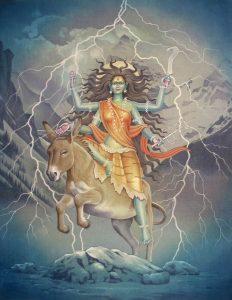
Book 5 Chapter 23
1-30. When the tormented Devas praised thus, the Devî created from Her body another supremely beautiful form. This created form, the Ambikâ Devî, became known in all the worlds as Kaus’ikî, as She came out of the physical sheath of the Devî Parvatî. When Kaus’ikî was created out of the body of Parvatî, the Parvatî’s body became transformed and turned out into a black colour and became known as KâIikâ. Her terrible black appearance, when beheld, increases the terror even of the Daityas. O King! This Devî is now become known in this world as Kâlarâtri, the night of destruction, at the end of the world, identified with Durgâ, the Fulfiller of all the desires.
Book 5 Chapter 26
31-61. A dreadful fight than ensued between Chandikâ and Chanda-Munda. Seeing that multitude of arrows, Ambikâ got very angry; out of Her frowny look, Her eyebrows became crooked, Her face became black, and Her eyes turned red like Kadalî flowers; at this time suddenly came out of Her forehead Kâlî. Wearing the tiger’s skin, cruel, covering Her body with elephant’s skin, wearing a garland of skulls, terrible, with a belly like a well dried up, mouth wide open, with a wide waist, lip hanging loosely, with axe, noose, S’iva’s weapon, in Her hands, She looked very terrible like the Night of Dissolution.
Book 6 Chapter 30
39-50. Vyâsa said :– O King! I am unable to describe what happened afterwards. O King! Out of the fire of anger of S’iva, the Pralaya seemed to threaten the three worlds. Vîrabhadra came into existence with hosts of Bhadra Kâlîs, ready to destroy the three worlds. Brahmâ and the other Devas took refuge to S’ankara. Though Mahâdeva lost everything on Satî’s departure, He, the Ocean of Mercy, destroyed the sacrifice of Daksa, cut off his head and instead placed the head of a goat, brought him back to life and thus made the Gods free from all fears.
-
Other stories from Devi Bhagwat PuraanBook 5 Chapter 9 – Kali helps Vishnu kill Madhu-Kaitabh
1-49. Bhagawati manifested herself in the form of Kali from the mouth and eyes of lord Vishnu. Madhu and Kaitabh are born from Vishnu’s ear-wax and attack Brahma. Brahma begs Vishnu for help but the two demons managed to counter Lord Vishnu’s power and after fighting with them for 5000 years the Lord was tired.
Then the supreme Yogi, Bhagavân Visnu, began to praise with folded palms that great Bhuva
nes’varî Mahâ Kâli, “O Devî! I bow down to Thee O Mahâmâyâ, the Creatrix and Destructrix! Thou beginningless and deathless! O auspicious Chandike! To-day Thy undescribable prowess has been experienced by me, I being made senseless and unconscious by Thy power of sleep. O Mother! By Thy power, Thou didst keep me unconscious and Thou again hast freed me from sleep, and I also fought so many times. O giver of one’s honour! Now I am tired; but Thou hast granted boon to the two Dânavas and therefore they are not getting tired. Therefore dost Thou help me now.”
50-59. Devî Mahâ Kâli, resting in the air, said smiling :– “O Deva deva Hari! Fight again; O Visnu! These two heroes, when deluded by My Mâyâ, would be slain by you; I will delude them certainly, by My side long glance; then slay quickly the two Dânavas, when conjured by My mâyâ”.
Then Hari, knowing the two Dânavas enchanted by Mahâmâyâ, thus :– O two heroes! I am very glad at the mode of your fighting. So ask from me boons. I will grant that to you.” The demons in return told lord Vishnu that they wanted to bless him with a boon. Lord Vishnu demanded their death. Seeing water on all sides the demons told him that he could kill them where no water was found. Lord Vishnu then severed their heads after laying them on his thighs and their marrow (meda) of them filled the ocean. For this reason, this earth is named Medinî and the earth is unfit for eatable purpose.
Book 7 Chapter 28 – Shakambhari Durga & Mahavidyas
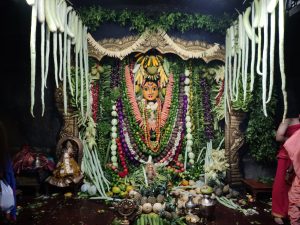
Asur Durgam was the son of Ruru, born in the family of Hiranyaksha. Once he thought that he must attain the Vedas – the four books of worldly knowledge from the Gods and sages and he must get his fair share from fire sacrifices. He practiced hard penance for one thousand years and asked Brahma to give him all the four books of Vedas.
From that time, the sages forgot all about the Vedas. So bathing, twlights, daily rituals, faith, sacrifices, and Japam and other rites and performances, all became extinct. Thus when great calamities befell on the earth, the Gods became gradually weaker and weaker, not getting their share of the sacrificial offerings. At this time, that demon invaded the city of heaven. And the Gods, not being able to fight with the demon fled in various directions. They took refuge in the caves of the mountain Sumeru and the inaccessible passes of the mountain and began to meditate on the Highest Force, the Great Goddess.
When oblations of clarified butter are offered to the Fire, those get transferred to the Sun and get transformed as rains. So when the Homa ceremonies disappeared, there was the scarcity of rain. The earth became quite dry and not a drop of water was found anywhere. Goddess Parvati went to Himalayas where Gods were praying to her. Gods informed her about the drought condition over the earth. Seeing the dreadful condition of the earth, she created innumerable eyes within Her body and became visible. That Upholder of the Universe, showed Her form and began to shed waters from Her eyes. For nine nights continuously, the heavy rains poured down out of the waters flowing from Her eyes.
The Gods that remained hidden in the mountain caves, now came out. Then the sages, united with the Gods, began to praise and sing hymns to the Goddess. Then, Shatakshi Devi transformed her appearance into a wonderful form, her eight hands held foods like grains, cereals, vegetables, greens, fruits, meat and other herbs, she wore a beautiful garment, this new form of Goddess is known as Shakambhari.
Goddess Parvati transformed her appearance. Now she looked ferocious in her new appearance. She was well equipped with all sorts of lethal weapons and was mounted on a lion. She thundered loudly and challenged Durgamasur. The terrible fight, then, ensued between the Goddess and the demons. The quarters on all aides resounded with harsh bow sounds and nothing could be heard. At this moment, came out of the body of the Devi, the principal Shaktis (forces incarnate) named Kali, Tarini, Tripura-Sundari, Bhuvaneshwari, Bhairavi, Chinnamasta, Dhumavati, Bagalamukhi, Matangi and Kamalatmika. The Navadurgas Shailaputri, Brahmacharini, Chandraghanta, Kushmanda, Skandamata, Katyayani, Kalratri, Mahagauri, Siddhidatri and Matrikas Brahmani, Vaishnavi, Maheshwari, Kaumari, Indrani, Varahi, Narasimhi, Shivadooti, Chamundai also came out of the Goddess.
When the Shaktis destroyed one hundred Aksauhini forces, Mridangas, conch-shells, lutes and other musical instruments were sounded in the battle-field. At this time, the enemy of the Gods, Durgamasur, came in front and first fought with the Shaktis. All the Shaktis of Goddess Parvati all merged into her body altogether. Then a terrible fight ensued for two Praharas (six hours) after which the Goddess killed the demon and was named Durga.
Book 9 Chapter 22 – Kali & Kartikeya fight Shankhachuda
Shankhachuda was an Asur had received the boon of invincibility. His armies were met with Shiva’s armies in a battle. The battlefield, then, assumed a grim aspect, as if the time of Dissolution had come. Bhagavân Mahâdeva sat under the Vata (peepul) tree with Kârtikeya and Bhadrakâlî. S’ankhachûda, decked with his jewel ornaments, sat on the jewel throne, surrounded by kotis and kotis of Dânavas. The S’ankara’s army got defeated at the hands of the Dânavas. The Devas, with cuts and wounds on their bodies, fled from the battlefield, terrified.
Kârtikeya gave words “Don’t fear” to the Devas and excited them. Only Skanda resisted the Dânava forces. The lotus eyed Kâlî also engaged in killing the Asuras. She became very angry and no sooner did She slay the Asura forces, than She began to drink their blood. She easily slew with Her one hand and at every time put into Her mouth ten lakhs, and hundred lakhs and Kotis and Kotis of elephants. Thousands and thousands of headless bodies came to be witnessed in the field. The bodies of the Dânavas were all cut and wounded by the arrows of Kârtikeya. After a huge fight, inflamed by anger, the Dânava threw that S’akti on Kârtikeya. The powerful Kârtikeya became senseless.
Bhadrakâlî immediately took Him on Her lap and carried him before S’iva. S’iva easily restored him to his life by his knowledge-power and gave him the indomitable strength. He then got up in full vigour. Bhadrakâlî went to the field to see the Kârtikeya’s forces. Nandîs’vara and other heroes, the Devas, Gandharbas, Yaksas, Râksasas and Kinnaras followed Her. Hundreds of war drums were sounded and hundreds of persons carried Madhu (wine). Going to the battle-ground, She gave a war-cry. The Dânava forces got fainted by that cry. Bhadrakâlî shouted aloud inauspicious peals after peals of laughter. Then She drank Madhu and danced in the battlefield. Ugra Damstrâ, Ugrachandâ, Kotavî, the Yoginîs, Dâkinîs, and the Devas all drank Madhu (wine).
Seeing Kâlî in the battlefield, S’ankhachûda came up again and imparted the spirit of Fearlessness to the Daityas, trembling with fear. Bhadrakâlî projected, then, the Fire weapon, flaming like the Great Dissolution Fire; but the king quickly put out that by the Watery weapon. Kâlî then projected the very violent and wonderful Varunâstra. The Dânava cut off that easily with Gandharbâstra. Kâlî then threw the flame-like Mahes’varâstra. The king made it futile by the Vaisnavâstra. Then the Devî purifying the Nârâyanâstra with the mantra, threw it on the king. At this the king instantly alighted from his chariot and bowed down to it. The Nârâyanâstra rose high up like the Dissolution Fire. S’ankhachûda fell prostrate on the ground with devotion. The Devî threw, then, the Brahmâstra, purifying it with Mantra. But it was rendered futile by the Dânava’s Brahmâstra. The Devî again shot the divine weapons purifying them with mantras; but they also were nullified by the divine weapons of the Dânava.
Then Bhadrakâlî threw one S’akti extending to one Yojana. The Daitya cut it to pieces by his divine weapon. The Devî, then, being very much enraged, became ready to throw Pâs’upata Âstra, when the Incorporeal Voice was heard from the Heavens, prohibiting Her, and saying, “O Devî! The high-souled Dânava would not be killed by the Pâs’upata weapon. For Brahmâ granted him this boon that until the Visnu’s Kavacha will remain on his neck and until his wife’s chastity be not violated, old age and death will not be able to touch him.”
Book 9 Chapter 1 – Kali worships Krishna
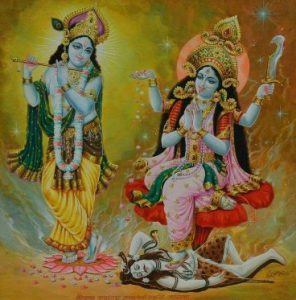
Now comes the lotus-eyed Mâhes’varî Kâlî who when angry can destroy all this universe in a moment, who sprang from the forehead of the Mûlâ Prakriti, Dûrgâ to slay the two demons S’umbha and Nis’umbha. She is the half-portion of Dûrgâ and qualified like Her, fiery and energetic. The beauty and splendour of whose body make one think as if the millions of suns have arisen simultaneously. Who is the foremost of all the S’aktis and is more powerful than any of them, Who grants success to all the persons, Who is superior
to all and is of Yogic nature, Who is exceedingly devoted to Krisna and like Him fiery, well-qualified, and valorous, Whose body has become black by the constant meditation of Shri Krishna, Who can destroy in one breath this whole Brahmânda, Who was engaged in fighting with the Daityas simply for sport and instruction to the people and Who, when pleased in worship can grant the four fruits Dharma, Artha, Kâma and Moksa. This Kâlî is also the part of Prakriti.
Book 10 Chapter 10 – Kali blesses the future 8th Manu
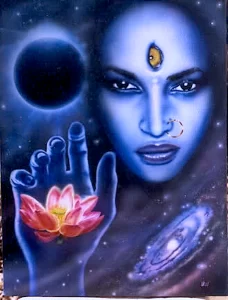
The Eighth Manu is the Sun’s son, known as Sâvarni. This personage, a devotee of the Devî, honoured by the kings, gentle, patient and powerful king Sâvarni worshipped the Devî in his previous births and, by Her boon, became the Lord of the Manvantara.
6-13. Nârâyana said :– O Nârada! This Eighth Manu had been, before, in the time of Svârochisa Manu (the second Manu), a famous king, known by the name of Suratha, born of the family of Chaitra, and very powerful. Once on a time, some of his powerful enemies destroyed the city of Kolâ, belonging to the revered king and succeeded in besieging his capital wherein he remained. Then the king Suratha, the conqueror of all his foes went out to fight with the enemies but he was defeated by them. Taking advantage of this opportunity, the king’s ministers robbed him of all his wealth. The illustrious king then went out of the city and with a sorrowful heart rode alone on his horse on the plea of having a game and walked to and fro, as if, absent-minded.
14-25. The king, then, went to the hermitage of the Muni Sumedhâ, who could see far-reaching things (a Man of the Fourth Dimension). The Muni said :– “O Lord of the earth! Hear the extremely wonderful glories of the Devî that have no equal and that can fructify all desires. She, the Mahâ Mâyâ, Who is all this world, is the Mother of Brahmâ, Visnu and Mahes’a. O King! Know verily that it is She and She alone, that can forcibly attract the hearts of all the Jîvas and throw them in dire utter delusion. She is always the Creatrix, Preservrix and Destructrix of the Universe in the form of Hara. This Mahâ Mâyâ fulfills the desires of all the Jîvas and She is known as the insurmountable Kâlarâtri. She is Kâlî, the Destructrix of all this universe and She is Kamalâ residing in the lotus. Know that this whole world rests on Her and it will become dissolved in Her. She is therefore, the Highest and Best. O King! Know, verily, that he alone can cross the delusion (Moha) on whom the Grace of the Devî falls and otherwise no one can escape from this Anâdi Moha.”
Ultimately the king manages to please the goddess and obtain the boon to become a future Manu.
Valmiki Ramayan Yuddha Kand
Indrajit promises to destroy Rama and Lakshmana. He sets out, for the battle, accompanied by his army. After reaching the battle-field, he performed a sacrificial ritual there:
Verse 73.22 – Then, that foremost of demons, having a radiance equal to that of fire, with excellent sacrificial incantations, performed a sacrifice, as per rules, making an oblation to fire.
Verse 73.24 – Duly spreading fire with reeds (in the form of other weapons) accompanied by lances there, Indrajit elapsed the neck of a live goat of dark hue (for offering it to the fire as an oblation).
Verse 73.25 – From the great fire of flames, set ablaze by that offering having been thrown into it acting at once without smoke, appeared such signs as had beckoned victory (of the past).
He appears then with the Maya Sita and beheads her in front of Raam and Lakshman – clearly sorcery was used. Later he performs penance to the goddess at Nikumbhila Hill which also seems to be a Tantrik goddess Prathiyangara Devi and can be equated with one of the forms of Kali.
Adbhut Ramayan Chapter 17
Lord Rama returns to Ayodhya with Sita and Lakshman after killing Dasanana and the sages and courtiers praise Rama for his valor. However, Sita remembers her childhood days, when a Brahmin in Mithila had talked about Ravana’s elder brother Sahasraskandha Ravana (thousand headed Ravana). He was the real Ravana who lived on a mountain named Pushkar. Sahastra Ravan was much more strong and powerful than his younger brother. Lord Rama mobilized his army of humans, vanars and rakshasa to conquer the Sahasraskandha Ravana. The war begins between the two and the Vanaras give a good start. When Ravana sees Rama’s army getting an upper hand he too decides to participate. As soon as he joins the war, he displaces humans to Ayodhya, vanaras to Kishkinda and rakshasa to Lanka.
Rama was so furious that he got himself ready to fight against Sahasraskandha Ravana. In their first encounter, Lord Rama used several celestial weapons including the Brahmastra but it had no effect on the Sahastra Ravana, he could easily deflect it. Though it agitated Lord Rama, he couldn’t do anything. He rendered Lord Rama unconscious.
After Rama was defeated, Sita transforms into Bhadrakali. She not only decapitated Ravana’s thousand heads but destroyed his entire army. All the Devas come to appease Bhadrakali after they realize that the earth will be destroyed by her temper. She immediately points to the Rama lying unconscious and mentions that since he was unconscious, she couldn’t think of the world’s welfare. Lord Brahma then restores Rama’s consciousness. Brahma then tells Rama that Sita is actually Parmatma known as Siva (Shakti of Lord Shiva). Sita then gives Rama the power to see her in the divine state. Rama is astonished. He then recites the Kali Saharanam.
-
Kali in Mahabharat
Virat Parva Section 6 – Kali blesses Yuddhishthir before the Pandavs go into hiding for the thirteenth year of their exile:
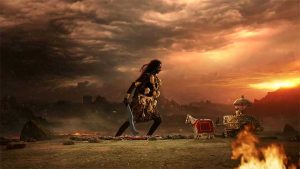
And while Yudhishthira was on his way to the delightful city of Virat, he began to praise mentally the Divine Durga, the Supreme Goddess of the Universe, born on the womb of Yasoda, and fond of the boons bestowed on her by Narayana, sprung from the race of cowherd Nanda, and the giver of prosperity, the enhancer (of the glory) of (the worshipper’s) family, the terrifier of Kansa, and the destroyer of Asuras,–and saluted the Goddess–her who ascended the skies when dashed (by Kansa) on a stony platform, who is the sister of Vasudeva, one who is always decked in celestial garlands and attired in celestial robes,–who is armed with scimitar and shield, and always rescues the worshipper sunk in sin, like a cow in the mire, who in the hours of distress calls upon that eternal giver of blessings for relieving him of their burdens.
And the king, desirous with his brothers of obtaining a sight of the Goddess, invoked her and began to praise her by reciting various names derived from (approved) hymns. And Yudhishthira said, ‘Salutations to thee, O giver of boons. O thou that art identical with Krishna, O maiden, O thou that hast observed the vow of Brahmacharya, O thou of body bright as the newly-risen Sun, O thou efface beautiful as the full moon.
O thou foremost of all deities, extend to me thy grace, show me thy mercy, and be thou the source of blessings to me. Thou art Jaya and Vijaya, and it is thou that givest victory in battle. Grant me victory, O Goddess, and give me boons also at this hour of distress. Thy eternal abode is on Vindhya–that foremost of mountains. O Kali, O Kali, thou art the great Kali, ever fond of wine and meat and animal sacrifice. Capable of going everywhere at will, and bestowing boons on thy devotees, thou art ever followed in thy journeys by Brahma and the other gods. By them that call upon thee for the relief of their burdens, and by them also that bow to thee at daybreak on Earth, there is nothing that cannot be attained in respect either of offspring or wealth. And because thou rescuest people from difficulties whether when they are afflicted in the wilderness or sinking in the great ocean, it is for this that thou art called Durga by all. And, O Durga, kind as thou art unto all that seek thy protection, and affectionate unto all thy devotees, grant me protection!'”
Thus praised by the son of Pandu, the Goddess showed herself unto him. And approaching the king, she addressed him in these words, ‘O mighty armed king, listen, O Lord, to these words of mine. Having vanquished and slain the ranks of the Kauravas through my grace, victory in battle will soon be thine. Thou shalt again lord it over the entire Earth, having made thy dominions destitute of thorns. And, O king, thou shalt also, with thy brothers, obtain great happiness. And through my grace, joy and health will be thine. And through my grace neither the Kuru’s spies, nor those that dwell in the country of the Matsyas, will succeed in recognising you all as long as ye reside in Virata’s city!’ And having said these words unto Yudhishthira, that chastiser of foes, and having arranged for the protection of the sons of Pandu, the Goddess disappeared there and then.”
Bhishma Parva SECTION XXIII – Arjun worships Kali before the beginning of the battle
“Arjuna said,–‘I bow to thee, O leader of Yogins, O thou that art identical with Brahman, O thou that dwellest in the forest of Mandara, O thou that art freed from decrepitude and decay, O Kali, O wife of Kapala, O thou that art of a black and tawny hue, I bow to thee. O bringer of benefits to thy devotees, I bow to thee, O Mahakali, O wife of the universal destroyer, I bow to thee.
O proud one, O thou that rescuest from dangers, O thou that art endued with every auspicious attribute. O thou that art sprung from the Kata race, O thou that deservest the most regardful worship, O fierce one, O giver of victory, O victory’s self, O thou that bearest a banner of peacock plumes, O thou that art decked with every ornament, O thou that bearest an awful spear, O thou that holdest a sword and shield, O thou that art the younger sister of the chief of cow-herds, O eldest one, O thou that wert born in the race of the cowherd Nanda! O thou that art always fond of buffalo’s blood, O thou that wert born in the race of Kusika, O thou that art dressed in yellow robes, O thou that hadst devoured Asuras assuming the face of a wolf, I bow to thee that art fond of battle!
O Uma, Sakambhari, O thou that art white in hue, O thou that art black in hue, O thou that hast slain the Asura Kaitabha, O thou that art yellow-eyed, O thou that art diverse-eyed, O thou of eyes that have the colour of smoke, I bow to thee. O thou that art the Vedas, the Srutis, and the highest virtue, O thou that art propitious to Brahmanas engaged in sacrifice, O thou that hast a knowledge of the past, thou that art ever present in the sacred abodes erected to thee in cities of Jamvudwipa, I bow to thee. Thou art the science of Brahma among sciences, and thou that art that sleep of creatures from which there is no waking. O mother of Skanda, O thou that possessest the six (highest) attributes, O Durga, O thou that dwellest in accessible regions, thou art described as Swaha, and Swadha, as Kala, as Kashta, and as Saraswati, as Savitra the mother of the Vedas, and as the science of Vedanta. With inner soul cleansed, I praise thee.
O great goddess, let victory always attend me through thy grace on the field of battle. In inaccessible regions, where there is fear, in places of difficulty, in the abodes of thy worshippers and in the nether regions (Patala), thou always dwellest. Thou always defeatest the Danavas. Thou art the unconsciousness, the sleep, the illusion, the modesty, the beauty of (all creatures). Thou art the twilight, thou art the day, thou art Savitri, and thou art the mother. Thou art contentment, thou art growth, thou art light. It is thou that supportest the Sun and the Moon and that makes them shine. Thou art the prosperity of those that are prosperous. The Siddhas and the Charanas behold thee in contemplation.'”
The goddess then blesses him–‘Within a short time thou shalt conquer thy foes, O Pandava. O invincible one, thou hast Narayana (again) for aiding thee. Thou art incapable of being defeated by foes, even by the wielder of the thunderbolt himself.’
-
Tamil Parata Venpa
Draupadi turns into Kali – Draupadi takes Devi’s roop and roams around in the forest at night. The Pandavas see her at night as Devi and get scared. She says she can defeat the Kauravas on her own, drink their blood, but she’ll allow her husbands to do it, to prove their Kshatriya-ness. As they didn’t save her during the vastraharan, now is their chance to take revenge.
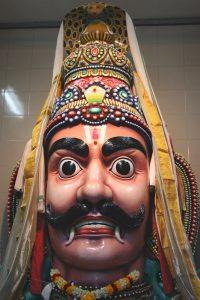
Story of Iravan/Kuttantavar cult – In original Mahabharat Arjuna, the third Pandava brother, is exiled from Indraprastha to go on a one-year pilgrimage as a penance for violating the terms of his marriage to Draupadi, the Pandava brothers’ common wife. Arjuna reaches the north-east region of present-day India and falls in love with Ulupi, a widowed Naga princess. The two get married and have a son named Iravan; later, Arjuna proceeds with his pilgrimage, leaving Iravan and Ulupi behind in Nagaloka, the abode of the Nagas. After reaching maturity, Iravan, hoping to be reunited with his father, departs for Indraloka, the abode of the god Indra, who is also Arjuna’s father. Upon meeting his adult son, Arjun requests his assistance in the Kurukshetra War.
In the Tamil Parata Venpa just before the Mahabharat war, Duryodhana learns from the Pandava’s expert astrologer, Sahadeva, that the day of the new moon, indeed the very next day, would be the most auspicious time for a kalappali. Consequently, Duryodhana approaches and convinces Aravan to be the sacrificial victim for the kalappali.
Krishna hears of Duryodhana’s plan, and devises one of his own, to ensure that Aravan will give himself as a sacrifice on behalf of the Pandavas rather than the Kauravas. Krishna first discusses the issue with Yudhishthira(Dharma or Dharmaraja), the eldest of the Pandavas, recommending the sacrifice to Kali as a part of an ayudha-puja (“worship of the weapons”). Krishna establishes that there are four candidates most suited to being offered as the victim: Shalya, who is on the side of Kauravas; Arjuna, the commander of the Pandavas; Aravan; and Krishna himself. From this shortlist, Krishna finally narrows the best choice down to Aravan. Aravan agrees to undergo the kalappali on behalf of the Pandavas but mentions his prior commitment to Duryodhana.
In Parata Venpa, Aravan asks Krishna to grant him the boon of a heroic death on the battlefield at the hands of a great hero. Although Parata Venpa mentions only one boon, the overall Tamil tradition preserves a total of three distinct boons associated with Aravan. In both the Kuttantavar and Draupadi cults, Aravan is believed to have been granted a second boon—to see the entire 18-day war. A second boon is indeed found in Villiputuralvar’s 14th-century version of the Mahabharata. In this version, Aravan is granted boons of watching the battle for a “few days” and of dying gloriously after killing many enemies.
The third boon is found only in the folk rituals. This third boon provides for Aravan to be married before the sacrifice, entitling him to the right of cremation and funerary offerings (bachelors were buried). However, no woman wanted to marry Aravan, fearing the inevitable doom of widowhood (see also sati). In the Kuttantavar cult version, Krishna solves this dilemma by taking on his female form, Mohini and spending that night with him. The Koovagam version additionally relates Krishna’s mourning as a widow after Aravan’s sacrifice the next day, after which he returns to his original masculine form for the duration of the war.
- In Karnataka Karaga is primarily a well-known tradition of Thigala community men. Thigalas believe that in the last part of the Mahabharat, when the Pandavas were shown a glimpse of hell, one last Asura called Tripurasura was still alive. At this time, Draupadi, the Pandava’s wife, took the form of Shakti. She created a huge army of soldiers called the Veerakumaras. After defeating the Asura, the soldiers asked Shakthi Devi to stay back with them. Though she had to go back, she promised them that she would come to stay with them every year during the first full moon of the first month of the Hindu calendar.
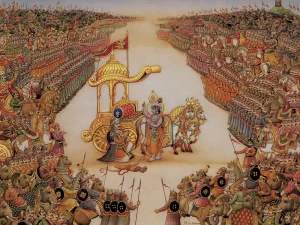
Different versions of the Mahabharata - Rajasthani tale of Barbarik – In the Skanda Purana, Barbarik was the son of Ghatotkacha and Maurvi. The gods (ashtadeva) gave him the three infallible arrows. When Barbarika learnt that battle between the Pandavas and the Kauravas had become inevitable, he wanted to witness what was to be the Mahābhārata War. He promised his mother that if he felt the urge to participate in the battle, he would join the side which would be losing. He rode to the field on his Blue Horse equipped with his three arrows and bow.
Krishna disguised as a Brahmin, stopped Barbarika to examine his strength. When asked how many days he would take to finish the war alone, Barbarika answered that he could finish it in one minute. Krishna then asked Barbarika how he’d finish the great battle with just three arrows. Barbarika replied that a single arrow was enough to destroy all his opponents in the war, and it would then return to his quiver. He stated that, the first arrow is used to mark all the things that he wants to destroy. If he uses the second arrow, then the second arrow will mark all the things that he wants to save. On using the third arrow, it will destroy all the things that are not marked and then return to his quiver. In other words, with one arrow he can fix all his targets and with the other he can destroy them.
Krishna tells that whichever side he supports will end up making the other side weaker due to his power. Thus, in an actual war, he will keep oscillating between two sides, thereby destroying the entire army of both sides and eventually only he would remain. Subsequently, none of the sides would become victorious and he would be the lone survivor. Krishna said that he considered Barbarika to be the bravest among Kshatriyas, and was hence asking for his head in charity. In fulfilment of his promise, and in compliance with the Krishna’s command, Barbarika gave his head to him in charity. This happened on the 12th day of the Shukla Paksha (bright half) of the month of Phaagun on Tuesday.
At the end of the battle, the victorious Pandava brothers argued amongst themselves as to who was responsible for their victory. Krishna suggested that Barbarika’s head, which had watched the whole battle should be allowed to judge. Barbarika replies, “All I could see were two things. One, a divine chakra spinning all around the battle field, killing all those who were not on the side of Dharma. The other was Goddess Mahakali, who spread out her tongue on the battle field and consumed all the sinners as her sacrifice”. Listening to this, Pandavas realise that it was Lord Narayan and Goddess Mahamaya who actually cleaned up the world from Adharma, and the Pandavas were mere instruments.
-
Transformation of Kalidas
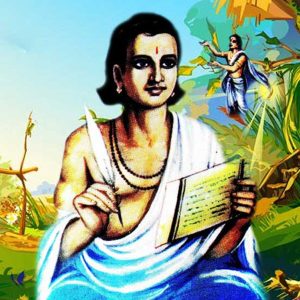
Around first century A.D., an ignorant and dull cowherd but with remarkable beauty , became the greatest Sanskrit poet and dramatist KALIDASA[ servant of Kali] due to the grace of the divine mother Kali. Kalidasa was tricked to marry the princess of Beneras because of the conspiracy of her father’s councillors but after worshipping the divine mother Kali he became one of the nine jewels in the court of King Vikramaditya of Ujjain.
So the princess was miserable that she had been fooled by the pundits, but what could she do? She told him to go to the Mother Kali temple that very evening and bolt the door from the inside. Then he had to pray to Mother Kali. When Mother Kali knocked at the door, he had to tell Her that he would allow Her to come in only if She agreed to bless him and make him a great scholar.
The young man obeyed his wife. Seeing his sincerity, Mother Kali looked at him and poured all Her Compassion into him. She said, “Open your mouth and show Me your tongue.” When he did so, She wrote down on his tongue an esoteric mantra — something most sacred and secret. Immediately, he was endowed with divine gifts: he became very cultured; he was able to speak Sanskrit fluently and he started composing poems.
Click Here to Check our Shop Site.


